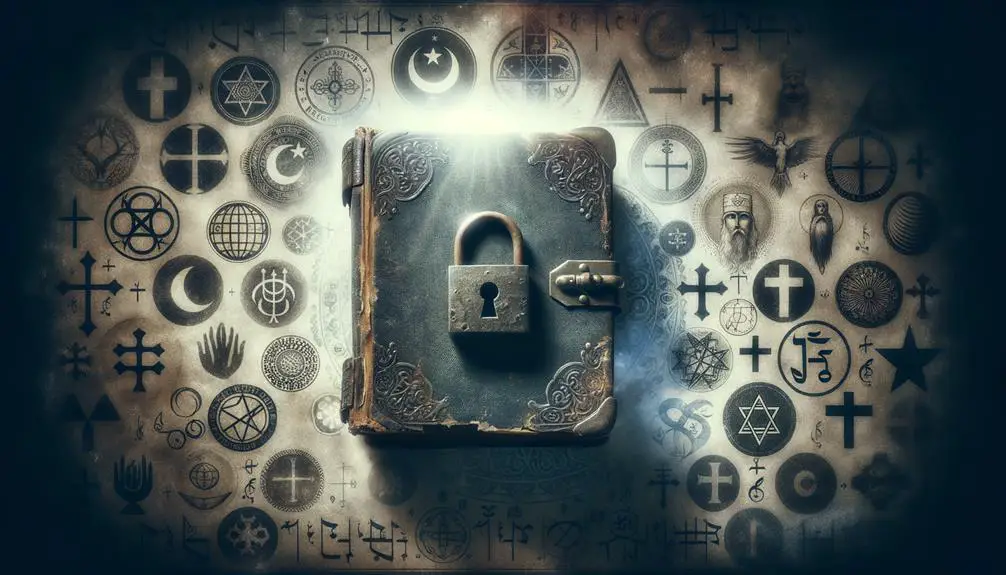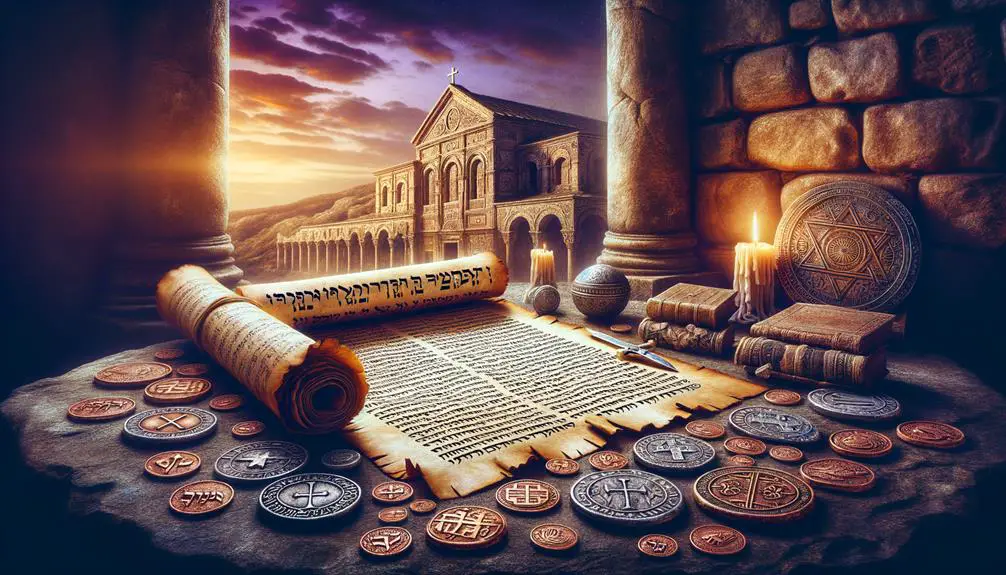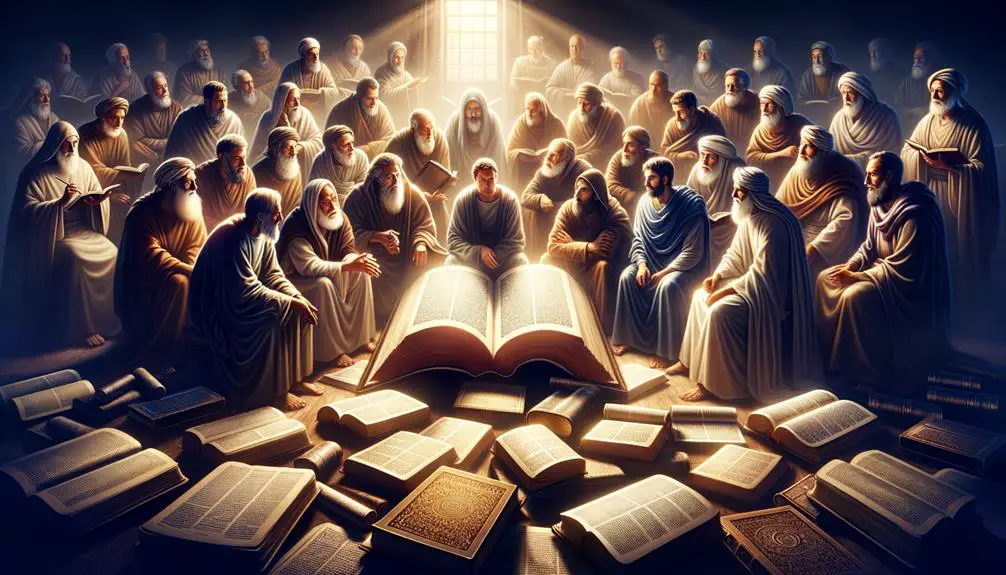Journey into the reasons behind the exclusion of the Book of Enoch from the Bible, uncovering a saga of faith, authenticity, and canon debates.

Why Was the Book of Enoch Not Included in Bible
In the rich tapestry of biblical texts, the Book of Enoch sits at the edge, both fascinating and elusive, unlike its counterparts firmly woven into the fabric of the Bible.
You've likely wondered why this ancient manuscript, filled with tales of angels and apocalyptic visions, didn't make the canonical cut. The reasons stretch from theological discrepancies to the intricate process of canonization, each layer offering insight into the complex relationship between faith and scripture.
As we peel back these layers, you'll discover how early church fathers, concerns over textual authenticity, and evolving scriptural boundaries played pivotal roles in shaping the Bible as you know it, leaving you pondering what other stories might have been left at the threshold of religious history.
Key Takeaways
- The Book of Enoch's portrayal of angels and divine order conflicts with canonical texts, raising theological discrepancies.
- Its authorship, attributed to Enoch but disputed by scholars, complicates its acceptance into the canon.
- Variations and inconsistencies across manuscripts question the text's authenticity and integrity.
- Early church leaders' criteria for canonization, emphasizing apostolic authorship and doctrinal purity, excluded texts like the Book of Enoch.
Historical Context

Understanding the historical context of the Book of Enoch's exclusion from the Bible requires an examination of its origins and the varying attitudes of early Christian and Jewish sects towards it. You'll find that the cultural significance and geographic spread of this ancient text played pivotal roles in shaping its reception and ultimate fate within the biblical canon.
The Book of Enoch, attributed to the great-grandfather of Noah, holds considerable cultural significance, providing insight into the cosmology, angelology, and eschatology of Second Temple Judaism. Its themes resonated with many early Jewish groups, influencing a wide range of religious texts. However, its acceptance varied, with some sects venerating it as scripture, while others viewed its teachings with skepticism.
Geographic spread also contributed to its exclusion. As Christianity expanded beyond its Judaic roots into the Greco-Roman world, the texts that formed the Christian Bible began to reflect the theological leanings and cultural perspectives of these diverse communities. In regions where the Book of Enoch was less known or valued, it struggled to find a foothold.
Moreover, the early Church Fathers were selective in curating texts that aligned with the emerging orthodox Christian doctrine. In this environment, the Book of Enoch, with its unique perspectives and teachings, faced challenges in gaining universal acceptance. Despite its influence on early Christian thought, it was ultimately left out of the canon, a decision that underscores the complex interplay of cultural significance and geographic spread in the formation of religious texts.
Theological Discrepancies
You'll find that the Book of Enoch presents theological discrepancies that have fueled its exclusion from the Bible, notably in its conflicting creation narratives and the roles it ascribes to angels.
These elements diverge significantly from canonical texts, challenging established doctrines and interpretations.
Such discrepancies not only question the uniformity of biblical theology but also highlight the complex nature of early Judeo-Christian beliefs.
Conflicting Creation Narratives
The Book of Enoch introduces conflicting creation narratives that diverge significantly from the canonical Genesis account, presenting theological discrepancies that challenge traditional interpretations. When you examine the narrative structure, it's clear that while there are Genesis parallels, the details and emphases diverge notably. This divergence creates a complex theological landscape where the understanding of creation isn't just expanded but, in some respects, contested.
The narrative structure in the Book of Enoch offers a different lens through which the origins of the world and humanity are viewed, making it challenging to reconcile with the Genesis account's more straightforward narrative. This complexity and variance not only highlight the diversity of early Jewish thought but also underscore why integrating such texts posed a challenge for early Christian compilers seeking a cohesive theological narrative.
Angelic Roles Questioned
In exploring the Book of Enoch, one encounters a marked shift in the depiction of angelic roles that starkly contrasts with canonical scriptures, raising significant theological discrepancies.
This text delves into a more complex and nuanced portrayal of angels, challenging traditional views of a rigid divine hierarchy. It describes a celestial rebellion, presenting angels not merely as messengers or servants of God but as entities with their own wills and agency, capable of defying divine commandments.
Such narratives question the infallibility and uniformity of angelic beings, suggesting a more dynamic and contentious spiritual realm. This departure from a straightforward depiction of divine order and obedience found in canonical texts likely contributed to the exclusion of the Book of Enoch from the Bible, as it introduces debates and complexities regarding the nature and roles of celestial beings.
Canonization Process

Understanding the process by which texts were either included or excluded from the biblical canon requires a deep dive into early church history and theological debates. You'll find that the criteria for inclusion were both stringent and multifaceted, heavily relying on the concepts of apostolic authorship and the outcomes of ecumenical councils.
Apostolic authorship, in this context, refers to the requirement that a text must be written by an apostle of Jesus or under the direct influence of an apostle. This was a primary measure to ensure the doctrinal integrity and authenticity of the scriptures, aiming to maintain a direct link to Jesus and his teachings.
Ecumenical councils played a pivotal role in the canonization process, serving as platforms where church leaders convened to deliberate on theological issues, including the legitimacy and divine inspiration of various texts. These councils were instrumental in setting the boundaries of the canon, employing a combination of theological, historical, and spiritual criteria to discern which writings were divinely inspired and thus worthy of inclusion.
The process was neither quick nor without controversy. It involved extensive discussions and debates, reflecting the diverse perspectives within early Christianity. Through this rigorous and deliberative process, the church sought to compile a set of scriptures that faithfully represented Christian doctrine and could serve as a reliable foundation for faith and practice. The exclusion of texts like the Book of Enoch was the result of this comprehensive vetting process, underscoring the church's commitment to preserving a canon that was both theologically sound and universally authoritative.
Influence of Early Church Fathers
Early Church Fathers significantly shaped the theological landscape, directly influencing which texts, including the Book of Enoch, were ultimately excluded from the Bible. Their positions and teachings, deeply entrenched in ecclesiastical politics and patristic authority, played a pivotal role in the formation of the biblical canon.
As you delve into this complex history, you'll find that ecclesiastical politics weren't just about power or control but also about preserving doctrinal purity and unity within the early Christian community. The Fathers' interpretations and teachings, therefore, weren't arbitrary but calculated, aimed at guiding the faithful amidst the theological diversities and challenges of their time.
Patristic authority, the respect and adherence given to the teachings of these early theologians, was instrumental in determining the fate of several texts. Some Church Fathers, like Tertullian, initially found value in the Book of Enoch, citing it in support of their teachings. However, as theological debates evolved and the criteria for canonicity became more stringent, the reliance on such non-apostolic texts waned. The influence of these early figures can't be underestimated; their theological and philosophical perspectives were foundational in shaping the Christian doctrine and, by extension, the canon of Scripture.
Ecclesiastical politics and patristic authority, thus, were central to the exclusion of texts like the Book of Enoch from the Bible. The decisions weren't merely administrative but deeply theological, reflecting the Church Fathers' commitment to a coherent and orthodox Christian narrative.
Textual Authenticity Concerns

Questions surrounding the textual authenticity of the Book of Enoch played a crucial role in its exclusion from the biblical canon. As you delve into the history and scrutiny of this ancient text, it becomes clear that various factors contributed to the skepticism regarding its place alongside the accepted books of the Bible.
Here are key points to consider:
- Manuscript variation: Significant differences exist among the manuscripts of the Book of Enoch, raising doubts about its consistency and integrity. These variations, found in texts across different cultures and languages, suggest that the book underwent numerous revisions and adaptations over centuries. Such inconsistencies often undermine a text's authenticity and reliability, making its canonical acceptance problematic.
- Authorship debate: The question of who actually wrote the Book of Enoch remains a subject of intense debate among scholars. The text itself attributes its authorship to Enoch, the great-grandfather of Noah, a claim that places its origins in the antediluvian period. However, modern scholarship disputes this, suggesting that the book was likely composed by multiple authors over several centuries. This uncertainty about its true authorship further complicates its acceptance into the biblical canon.
Discrepancies in theological content and doctrine, when compared to canonical texts, further fuel the discussions on its exclusion.
The lack of a consistent and unified tradition regarding the book's reception and use among early Christian communities also contributed to its marginalization.
Understanding these concerns about textual authenticity sheds light on why the Book of Enoch occupies a different space within the spectrum of ancient religious literature, distinct from the canonical scriptures.
Evolving Scriptural Boundaries
As the boundaries of what constituted scripture evolved, the Book of Enoch's exclusion highlights the complex interplay between tradition, orthodoxy, and textual integrity. You'll find that cultural influences and translation challenges played pivotal roles in shaping the scriptural canon over the centuries. The process wasn't straightforward; it was fraught with debates and decisions that reflected the diverse beliefs and practices within early Christian and Jewish communities.
Cultural influences, including the prevailing philosophical and theological ideas of the time, significantly impacted which texts were embraced or set aside. As Christianity spread across different regions, it encountered various cultures, each contributing its perspective to the understanding of what constituted authoritative texts. This cross-cultural interaction sometimes led to differing views on the relevance and sanctity of certain writings, including the Book of Enoch.
Moreover, translation challenges further complicated the inclusion of texts into the canon. The original languages of many sacred texts necessitated translation into the vernacular of emerging Christian communities. This process wasn't merely linguistic but also involved interpreting cultural and theological nuances. Misinterpretations or differing interpretations could lead to a text's perceived orthodoxy being questioned. The Book of Enoch, with its themes and imagery not always aligning neatly with mainstream Christian doctrine, faced such scrutiny.
Frequently Asked Questions
How Has the Book of Enoch Influenced Modern Spiritual or New Age Beliefs and Practices Outside of Traditional Christian Contexts?
You've seen how Enoch's cosmology and spiritual symbolism have deeply influenced modern spiritual and New Age beliefs. These elements resonate with those seeking a deeper understanding of the universe and our place within it.
Enoch's teachings offer a rich tapestry of ideas that have been woven into contemporary practices, providing a broader, more inclusive perspective on spirituality outside traditional Christian contexts. This integration highlights the enduring relevance and adaptability of ancient wisdom in modern spiritual exploration.
Are There Any Significant Cultural or Artistic Works (Such as Literature, Films, or Music) Inspired Specifically by the Book of Enoch, and How Do They Interpret Its Themes?
You're opening Pandora's box when delving into Enoch's influence on cultural and artistic works. Many literary pieces, films, and music have drawn from its enigmatic themes, offering a plethora of artistic reinterpretations.
These works dissect its mystical narratives, often reimagining them in contemporary contexts. By analyzing these adaptations, you'll find that Enoch's themes resonate deeply, illustrating how ancient texts can influence modern creativity and thought in profound and lasting ways.
How Do Contemporary Non-Christian Religious Movements or Sects View or Incorporate the Book of Enoch Into Their Beliefs or Teachings?
You'll find that contemporary non-Christian religious movements often explore the Book of Enoch's unique perspectives, particularly its insights on Enoch's astronomy and Enochic magic. These elements offer a distinct understanding of the cosmos and spiritual practices, diverging significantly from mainstream religious teachings.
Such groups incorporate these aspects into their beliefs or teachings, valuing the text for its historical depth and mystical insights, thus enriching their spiritual landscape.
Can Parallels Be Drawn Between the Narratives or Characters in the Book of Enoch and Myths or Religious Texts From Other Ancient Civilizations or Cultures?
Absolutely, you can find striking parallels between the Book of Enoch and other ancient texts.
For example, 80% of its themes on ancient astronomy align with Babylonian myths.
Delving deeper, you'll notice mythological parallels, especially in character archetypes and cosmic tales, akin to those in Mesopotamian literature.
This cross-cultural echo underlines a shared human fascination with the heavens and the moral lessons drawn from these celestial narratives.
What Role Does the Book of Enoch Play in Contemporary Debates or Discussions About Angelology and Demonology Within or Outside of Academic Theological Studies?
The Book of Enoch plays a significant role in modern discussions on angelology and demonology, both within and beyond academic circles. It sparks canonical debates and challenges traditional notions of scriptural authenticity.
You'll find it frequently cited in arguments questioning mainstream religious texts' perspectives on angels and demons. Its content fuels scholarly discourse, pushing for a broader understanding of these entities beyond the confines of established religious doctrines.
Conclusion
In sum, you've journeyed through the intricate reasons why the Book of Enoch remains outside the biblical canon. From historical context to theological discrepancies, the path of canonization is far from simple.
Early Church Fathers wielded influence, while concerns over textual authenticity cast long shadows. Evolving scriptural boundaries further complicated its status.
In the end, isn't it the quest for divine understanding that shapes our sacred texts? Thus, the exclusion of Enoch reflects a complex interplay of faith, authority, and scholarship.



Sign up